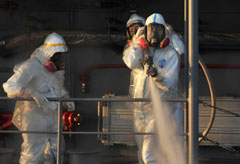Japan nuclear crisis upgraded to Chernobyl level
Japanese safety authorities have raised the severity rating of the nuclear disaster to the highest level today, on a par with the 1986 Chernobyl disaster

Japanese safety authorities have raised the severity rating of the nuclear disaster to the highest level today, on a par with the 1986 Chernobyl disaster
Japan has today raised the severity rating of the nuclear crisis from five to seven, reflecting the total release of radiation at the damaged Fukushima Daiichi power plant.
An official from the Nuclear Safety Commission of Japan said the amount of radiation leaking from the plant was around 10 per cent of that in the Chernobyl accident, but insisted the rating had been raised due to the wider consequences.
‘We have upgraded the severity level to seven as the impact of radiation leaks has been widespread from the air, vegetables, tap water and the ocean,’ says Minoru Oogoda of Japan’s Nuclear and Industrial Safety Agency (Nisa).
Setbacks at the stricken plant continued yesterday as aftershocks from the magnitude-9.0 earthquake briefly cut power to back-up pumps, halting the injection of cooling water for almost an hour before power was restored.
As Japan plans to extend the evacuation zone because of radiation concerns, Tepco, the company under fire for its handling of the accident and its lack of preparation before the earthquake, issued yet another apology.
‘We deeply apologise for causing tremendous trouble to those who live near the nuclear complex and people in the prefecture,’ says Tepco spokesman Naoki Tsunoda.
Marie Claire Newsletter
Celebrity news, beauty, fashion advice, and fascinating features, delivered straight to your inbox!
Over a month after the disaster, more than 145,000 people are still living in shelters and the government yesterday added five communities to a list of places people should leave to avoid long-term radiation exposure.
Almost 190,000 people have fled their homes as authorities work to contain the adverse effects. Marie Claire’s travel editor, Nigel Tisdall, says the extent of the disaster will have a powerful impact on Japan’s tourism during its peak months of April and May.
‘Inevitably visitors to Tokyo have dropped by 75 per cent and to Osaka by 50 per cent,’ he says. ‘The Foreign and Commonwealth Office is only advising essential travel to those areas northeast of Tokyo most affected by the earthquake and the tsunami.
'Many Japanese people rely on tourism for their livelihoods and travellers should realise that the whole country is by no means off limits.'
For the latest information, including the threats posed by the damaged Fukushima nuclear power plant, visit: fco.gov.uk/en/travel-and-living-abroad/travel-advice-by-country/asia-oceania/japan
-
 I tried Sofia Grainge’s go-to lymphatic drainage massage - and the results were astonishing
I tried Sofia Grainge’s go-to lymphatic drainage massage - and the results were astonishingThe results go way beyond aesthetics.
By Ashleigh Spiliopoulou
-
 My dry skin loves a tinted moisturiser in the summer months—this one is *outstanding*
My dry skin loves a tinted moisturiser in the summer months—this one is *outstanding*It ticks the boxes for coverage and nourishment
By Matilda Stanley
-
 I was overusing (and wasting) my skincare products until a dermatologist taught me this trick
I was overusing (and wasting) my skincare products until a dermatologist taught me this trickLess slathering, more targeting.
By Darcy Brown